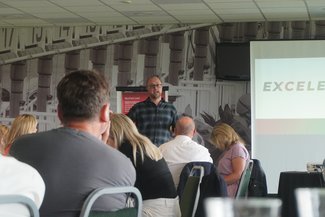Change is tough for any organisation. Education, in particular – a sector not always known for its agility and adaptability – poses a unique combination of hurdles. As Executive Director of Waldorf UK, the national representative body for Steiner Waldorf education in the UK, I speak from experience. In 2019, our association faced an existential crisis when Ofsted rated three-quarters of our member schools either ‘Inadequate’ or ‘Requires Improvement’. It was a pivotal moment that demanded a profound re-examination of everything we did and how we were doing it.
The first German Steiner school opened in 1919, and British Waldorf education marks its 100th anniversary in 2025. But we had to face up to the fact that it had lost its way. As part of a newly appointed team, we were given a clear mandate to navigate and support schools through a transformation that was essential for Steiner Waldorf education to survive in the UK and be relevant for today’s children.
Implementing change during a crisis
Our crisis response had to address the weaknesses identified in Ofsted inspections, but in a way that enhanced rather than undermined Waldorf pedagogy. Many criticisms were familiar, reflecting issues that had circulated in our schools for several years. A genuine, wide-ranging reflection on everything we did was necessary, whilst simultaneously taking care to preserve the positive aspects of what makes our approach unique.
Immediate work was done to improve safeguarding and compliance with other statutory requirements. Waldorf UK commissioned an extensive consultation with our schools to see what they felt was needed in the medium term. Subsequently, the new team created a wide-ranging CPD programme to upskill teachers and support school leaders.

Waldorf education is rooted in holistic approaches. Our creative, interdisciplinary curriculum has long been renowned for its richness, but it is also complex. A key principle is that teachers are required to co-design a cross-curricular approach, adapted and tailored to the children they teach. There is space for tremendous creativity and autonomy, but the work for teachers and schools is also demanding in terms of planning and consistency.
We brought together experienced Steiner Waldorf pedagogues and a new approach to understanding the curriculum based on ‘generative principles’ – generated by the underpinning philosophical approach and generating practice. This led to the development of a digital planning tool, which allowed teachers to map their planning to a curriculum framework of learning opportunities and assessment criteria for each age group, creating a consistent approach that met both Ofsted requirements and the Independent School Standards.
We also upgraded some of our traditional delivery approaches. Our new reading scheme, for example, blends the richness of oral language and storytelling from our traditional model with a systematic approach to phonics. Meanwhile, a partnership with Math for Love in the United States is providing bespoke teacher training, supporting children to develop mathematical problem solving, thinking skills and confidence alongside knowledge and skills.
We’ve also launched new teacher training programmes. The first, a collaboration between Bath Spa University and the Waldorf Learning Foundation, provides a PGDip in Waldorf Education and Creative Pedagogies, to support PGCE/QTS qualified teachers to work in Waldorf schools. The second is a new initial teacher training course at the University of Buckingham in partnership with York Steiner School. This combines a PGDip in Waldorf Education with an apprenticeship PGCE/QTS programme within a Waldorf school.
The most pivotal change has been in school leadership, which was felt to be the source of the issues faced by our schools. In most schools, the previous model of teachers running a school together has been replaced by more clearly defined structures consisting of Heads, Principals and School Leads. There’s still a strong commitment to collaboration and professional respect that is central to Waldorf’s ethos, but with better defined roles, transparency and accountability. This provides schools with the expertise they previously lacked in operating in a highly regulated environment. To support this we’re increasingly utilising the Big Education leadership programme, with further funding hoping to develop this more.

Joining the Deeper Learning UK Network
Another change was to become more outward looking. The introspection of Waldorf education in previous years was not healthy. A perfect home for us has been the Deeper Learning UK Network, where we’ve been able to connect with educationalists who share our values and commitment to a broad, creative curriculum. Members have been generous with ideas, advice and support for which we are more grateful than they realise! Connecting our school leaders with others in the network has been transformative for sharing best practice.
Waldorf UK's renewed vision for education
By rebranding as Waldorf UK, our organisation is drawing a line under the past and signalling a fresh, exciting stage in our development. We’re looking forward to learning from and contributing to the UK’s wider educational landscape. Most of our schools are now judged ‘Good’ by Ofsted with strong safeguarding and no ‘Inadequate’ schools. Our curriculum work is attracting interest internationally and we recently presented to the European Commission. Kath Bransby, our national education coordinator, is acting as expert advisor to the Chartered College ‘Rethinking Curriculum’ project, and we’ve recently contributed to several educational publications. Over time, we also hope to rebuild our state sector offer. Our re-brokered academies were hugely popular with parents, being many times oversubscribed. Waldorf schools were never intended to be elitist and don’t sit entirely comfortably within the independent sector.

Waldorf UK hasn’t perfected every step, nor have we reached our destination. But we have a clear vision of where we’re going and how to get there. While there’s still a way to go, we’re confident that we’ve made enough progress that there’s no turning back. As we continue evolving, we’re not just poised to survive, but to positively contribute to the wider educational landscape and the changes to education so necessary for supporting children in the UK to thrive. This goal drives the whole Waldorf UK team and the teachers and leaders in our schools.
Fran Russell is the Chief Executive of Waldorf UK. She was formerly a children’s rights lawyer and senior charity executive. She became involved in education after playing a leading role in the development of the Greenwich Waldorf School.

